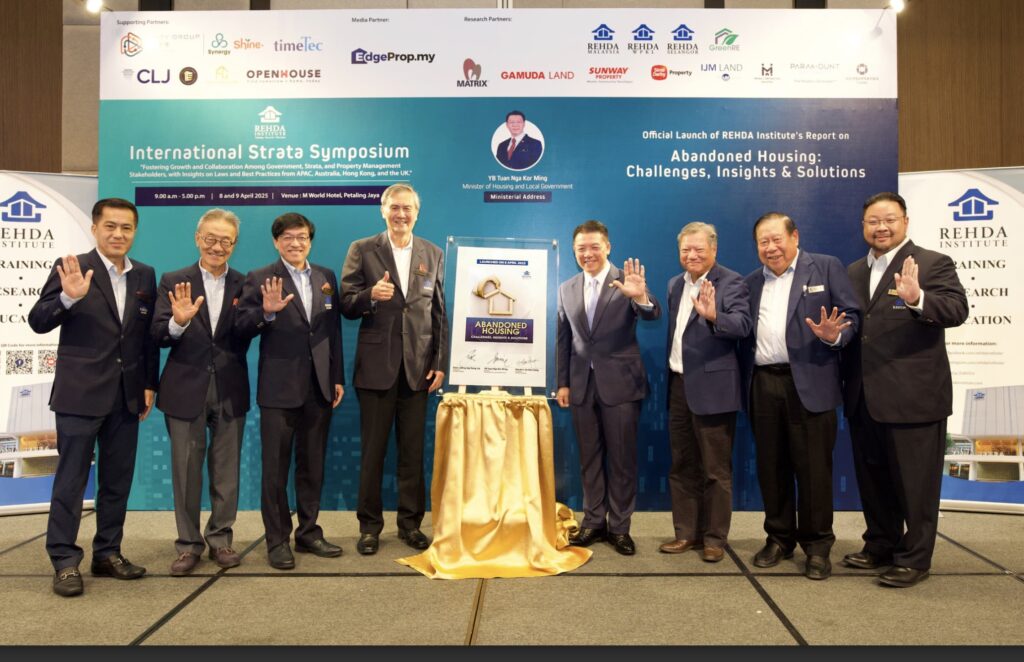REHDA Institute Unveils Landmark Research Report on Abandoned Housing at the International Strata Symposium 2025

REHDA Institute Unveils Landmark Research Report on Abandoned Housing at the International Strata Symposium 2025
8 April 2025 | Petaling Jaya, Malaysia – The 2025 REHDA Institute International Strata Symposium, hosted by the REHDA Institute, which was attended by more than 280 regional industry stakeholders, marked a significant moment for the Malaysian housing sector with the official launch of the REHDA Institute’s Abandoned Housing – Challenges, Insights & Solutions Research Report. The research report was launched by YB Tuan Nga Kor Ming, Minister of Housing and Local Government, offering a thorough analysis of Malaysia’s abandoned housing including the causes alongside practical policy recommendations aimed at preventing future occurrences.
The Extent of Malaysia’s Abandoned Housing
As of the end of 2024, Malaysia recorded 111,929 abandoned and “sick” housing units across 726 projects, resulting in significant financial and emotional distress for thousands of homebuyers. While licensed developers generally maintain a strong track record, many abandoned projects are linked to unlicensed or financially unstable developers, compounding the challenges for homebuyers and damaging the reputation of the industry.
The REHDA Institute Research Report on Abandoned Housing, developed in collaboration with the University of Malaya, represents a crucial step in understanding the root causes behind project abandonment. The research report draws on extensive research and consultation with a broad range of stakeholders, including government bodies, liquidators, developers, bankers, lawyers and architects and was further refined through a dedicated workshop held on 11 October 2024.
Causes of Project Abandonment
The report identifies four major factors contributing to the abandonment of housing projects:
- Economic and Financial Factors – Economic downturns (such as recessions or pandemics), insufficient funding, poor cash flow management and rising labour/material costs.
- Project Development Challenges – Disputes between landowners and developers, Local Authorities’ requirements (including infrastructure), technical issues and corruption.
- Market Conditions – Mismatch between housing supply and actual market demand, where oversupply in certain locations or segments leads to weak demand and poor sales performance
A Call for Immediate Policy Action
The REHDA Institute Report on Abandoned Housing offers a clear framework for tackling this pressing issue, with a focus on improved enforcement, financial discipline and legal reforms. Key recommendations include:
- Strengthening Regulatory Monitoring Systems
- Establish a Centralised Monitoring System to ensure that the development process is transparent at all levels between the various stakeholders. The objective is to implement a real-time project tracking system to identify early warning signs of financial distress and delays.
- Market-Driven Housing Policies
- Eliminate Price-Controlled Housing Mandates – Remove price-controlled housing quotas, as these have led to cross-subsidisation and inflated open-market prices affecting financial feasibility.
- Introduce a Tiered Developer Classification System as part of the licensing process. Developers would be assessed based on financial capacity and non-financial indicators such as experience and past project performance, with the aim of reducing bureaucratic processes. Higher ratings would denote experienced developers with strong track records, whilst lower ratings would indicate limited experience.
- Higher-rated developers would benefit from greater regulatory flexibility, including liberalised provisions under Schedules G and H. These measures would enhance cash flow management and support accelerated project delivery.
- Lower-rated developers would be subject to more stringent financial and feasibility assessments to ensure project viability and mitigate risk.
- Financial Safeguards to Prevent Project Abandonment
- Introduce a Housing Completion Guarantee System for Malaysia, developed after the Korea Housing & Urban Guarantee Corporation (HUG), this system would protect homebuyers from financial losses and ensure projects are completed even in cases of developer insolvency.
- Enhance Transparency in Housing Development Accounts (HDA) – Enforce stricter compliance measures to prevent fund mismanagement by developers.
- Reinforcing Stakeholder Accountability
- Penalties for Non-Compliance – Legal Action should be taken against developers and stakeholders involved in property development for regulatory breaches, project abandonment or financial mismanagement. Banks should also be held accountable when funds are withdrawn prematurely.
Shaping Future Housing Policies
The launch of the REHDA Institute Research Report is set to ignite vital discussions among policymakers, industry leaders and housing stakeholders to ensure effective measures are taken to prevent housing abandonment. REHDA Institute is committed to working with the Government and relevant parties to advocate for improved regulations and stronger consumer protection. As a leading provider of intellectual and human capital in the property sector, REHDA Institute has fostered research, innovation and collaboration for two decades. We proudly celebrated our 20th anniversary last November, marking a key milestone in our journey as a Malaysian-based think tank with growing regional recognition.
